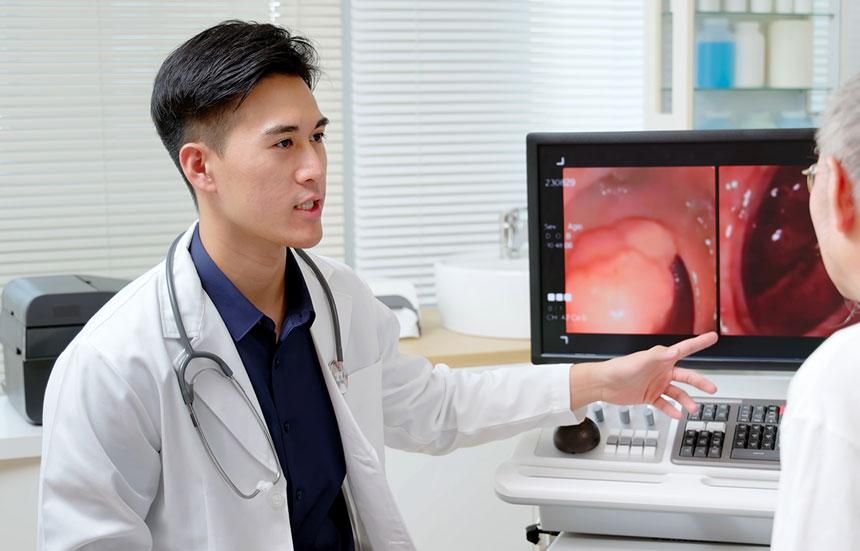Don’t Avoid This Important Screening

It used to be that turning 50 wasn’t just an age milestone – it was a sign that you needed to schedule a colonoscopy.
Colon cancer affects the large intestine (colon) and rectum. Until recently, the only effective screening tool was colonoscopy, which many people avoid or put off because of discomfort, embarrassment or fear.
Times change. Now, medical guidelines call for earlier screening (age 45) for colon cancer, or colorectal cancer, due to a rise in diagnoses among people younger than 50. Fortunately, there are new, less invasive ways to screen for the disease.
Colon cancer screenings still aren’t fun — but colon cancer is much worse. It’s one of the most common cancers in the United States, but with early detection and lifestyle adjustments, we can manage it effectively.
These five tips will help you understand your personal risk factors, screening options and what symptoms to look out for.
1. Regular Screening is Essential
The most effective ways to combat colon cancer is through regular screening. The American Cancer Society recommends that screening for colon cancer begin at age 45 for those at average risk. If you have a family history of the disease or other risk factors, you might need to start earlier.
Screening can lead to early detection and even treatment. In colonoscopies, for example, a doctor uses a camera on a flexible tube to spot precancerous polyps before they develop into cancer. The colonoscope has the ability to remove those polyps during the procedure.
Other screening options that are available can identify your risk for developing colon cancer. At-homestool tests include the fecal immunochemical test (FIT), which is up to 79% accurate and usually covered by insurance. FIT tests look for blood in stool, a possible early sign of cancer.
A newer stool test called Cologuard looks for blood and abnormal DNA in stool samples. It is up to 92% effective but is significantly more expensive and needs to be repeated every three years. It can also lead to false positives in a small percentage of tests.
Like colonoscopies, flexible sigmoidoscopies use a camera to check your bowels, but they are less invasive because they only examine the lower third of your intestine.
Talk to your doctor about which test is right for you based on your health history, risk factors and personal preferences.
Follow up screenings will depend on which test you take and your risk factors for colon cancer.
2. Colon cancer is on the rise among younger people
Despite being the third most common cancer, the overall risk of developing the disease has actually been falling over the last several years. There is one big exception to this decreased risk: young people. Colon cancer is considered “early onset” when it happens to people under age 50. According to a 2017 study, millennials are twice as likely to develop colon cancer as people born in 1950.
Early onset colon cancer has a significantly higher mortality rate than cases over age 50. This isn’t because the cancers are more aggressive — these cases are more likely to be discovered at later stages when they are harder to treat.
About 40-50% of early onset colon cancers are linked to a definable risk factor, including ulcerative colitis, a known family history or an inherited colorectal cancer syndrome.
If you or a loved one are under 50 and have a known colon cancer risk factor, it is especially important to be vigilant about any bowel changes or new symptoms. Be prepared by proactively talking to your doctor about your screening test options.
3. Watch out for these symptoms
Regular screening is your best chance at catching colon cancer early, but symptoms may also appear. Here are the most common:
- Changes in bowel habits: Persistent diarrhea, constipation or a change in the consistency of your stool.
- Rectal bleeding: Blood in your stool or bleeding from the rectum.
- Abdominal pain: Persistent cramping or abdominal pain that doesn't go away.
- Unexplained weight loss: Losing weight without trying.
If you develop any of these symptoms, see your doctor right away. These symptoms could have a variety of causes and do not necessarily mean you have colon cancer, but it’s important to be screened. Remember: if you notice any unusual changes in your body, bowel-related or otherwise, it’s imperative that you tell your doctor as soon as possible.
4. Understand your personal risk factors
Certain risk factors can increase your likelihood of one day developing colon cancer. The following are the most common, according to the CDC, the most common risk factors include:
- Being over 50 years of age
- Inflammatory bowel disease such as Crohn's disease or ulcerative colitis.
- Personal or family history of colorectal polyps.
- Certain genetic syndromes, such as familial adenomatous polyposis (FAP) or hereditary non-polyposis colorectal cancer (Lynch syndrome).
In addition to medical risks, there are also lifestyle risk factors, including:
- Not getting enough exercise
- Not eating enough fruits and vegetables
- A diet low in fiber and high in fat and processed meats
- Being overweight or obese
- Drinking alcohol
- Using tobacco products
5. Maintain a healthy lifestyle
While factors like age and family history are beyond your control, you can take steps to mitigate lifestyle risks. Get regular exercise (150 minutes a week) and eat a fiber-rich diet that’s heavy on fruits/veggies and light on fat/processed meat. If you have added risk from being overweight or obese, work with your physician on a weight-loss plan. Limit your alcohol intake and quit smoking (or any tobacco use, including chewing and vaping).
Colon cancer is a serious and often frightening diagnosis, but it is often manageable when caught early. Regular screenings, a healthy lifestyle, awareness of symptoms and prompt action if diagnosed are essential components of effective management.
And next time you’re in the office, check with your doctor to make sure you’re up-to-date on all your screenings.


